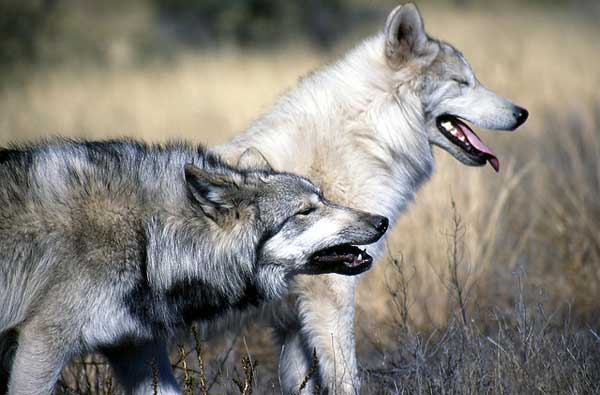The British Columbia government has announced plans to immediately begin killing up to 184 wolves to protect mountain caribou in two regions of the province.
The plan is to kill between 120 and 160 wolves in the South Peace in northern B.C., and 24 wolves in the South Selkirk in southeastern B.C.
In both cases, the plan is for ministry staff in helicopters to shoot the wolves before the snow melts.
The plan has angered some conservationists who argued that the cull won't work because the real problem for caribou is the loss of their habitat.
However, according to an announcement from the Ministry of Forests, Lands and Natural Resource Operations, the cull is needed because previous methods used to reduce the number of wolves haven't worked.
"Hunting and trapping of wolves have not effectively reduced populations and may even split up packs and increase predation rates on caribou," the written statement said.
"Habitat recovery continues to be an important part of caribou recovery, but cannot address the critical needs of these herds in the short term," it added.
The South Selkirk mountain caribou herd was down to 18 animals in March 2014 from 46 in 2009. Wolves have killed two of the remaining caribou in the past 10 months, the government announcement said.
In four herds in the South Peace, totalling as few as 163 caribou, at least 37 per cent of deaths of caribou are caused by wolves, according to the announcement.
The government's release said the plans had been peer-reviewed, though ministry spokespeople did not immediately respond to a request for copies of the review documents.
Conservationists oppose cull
But critics said they disagreed with the science used to justify the cull.
Sadie Parr, the director of Wolf Awareness Inc. in Golden, said, "Part of what I want to point out is how scientifically unsound this is... killing wolves to increase ungulate populations has not worked in history in the long term."
Killing wolves to protect caribou will commit the government to 60 years or more of continued culls, since it will take that long for caribou herds to recover and new wolves will move in from other areas to fill the gap left by ones the government kills, she said, noting as well the expense of flying helicopters for the program.
The cull announcement follows the completion last year of a Grey Wolf Management Plan that divided the province into two zones. In most areas, wolf populations were to be managed through hunting and trapping regulations such as season lengths and bag limits.
In areas where growing wolf numbers threaten livestock or wildlife, the government would help stakeholders, ranchers and First Nations manage the problem, the government said at the time, adding, "In these areas, detailed implementation plans would be developed before any actions are undertaken."
Thursday's release from the government said the wolf management plan "allows for measures such as targeted aerial wolf removal in support of caribou protection for circumstances exactly like those occurring in the South Peace and South Selkirk herds."
Wolves are plentiful, it added, noting there are around 8,500 wolves in the province. "The risk of removing the number of wolves recommended is very low, whereas the risk to pertinent caribou populations of doing nothing is very high."
Chris Darimont, the Hakai-Raincoast professor in geography at the University of Victoria, and the co-author of two books on coastal wolves, said, "This is a last ditch, Hail Mary effort to save caribou that are on their way out not because of wolves, but because of development, and aggressive development, by humans in their habitat for a few decades now."
Forestry and oil and gas activity change the landscape in ways that favour wolves, Darimont said, including opening areas to roads and recreation. The threat to caribou has been known for at least a decade, he said, but there's been no slowdown in development.
Culling wolves likely won't save the threatened caribou and it gives industry and the government an excuse not to move ahead with the habitat protection that's needed, he said. "Their way of dealing with it will likely not work, or certainly not work in every case," he said, citing research from wolf culls in Alberta.
"These landscapes are not going to favour caribou again for a very long time," said Darimont. "The damage that's been done is greater than the ability of caribou to recover, even with aggressive intervention." ![]()
Read more: BC Politics
















Tyee Commenting Guidelines
Comments that violate guidelines risk being deleted, and violations may result in a temporary or permanent user ban. Maintain the spirit of good conversation to stay in the discussion.
*Please note The Tyee is not a forum for spreading misinformation about COVID-19, denying its existence or minimizing its risk to public health.
Do:
Do not: